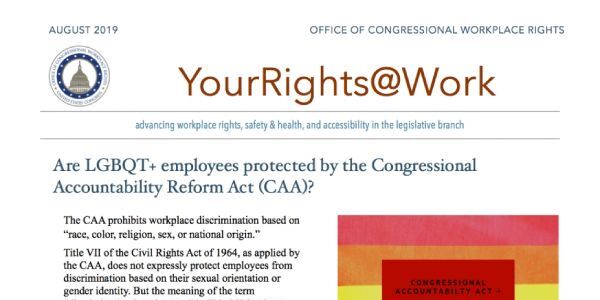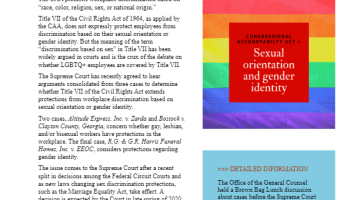Are LGBQT+ employees protected by the Congressional Accountability Reform Act (CAA)?
The CAA prohibits workplace discrimination based on “race, color, religion, sex, or national origin.” Title VII of the Civil Rights Act of 1964, as applied by the CAA, does not expressly protect employees from discrimination based on their sexual orientation or gender identity. But the meaning of the term “discrimination based on sex” in Title VII has been widely argued in courts and is the crux of the debate on whether LGBTQ+ employees are covered by Title VII.
The Supreme Court has recently agreed to hear arguments consolidated from three cases to determine whether Title VII of the Civil Rights Act extends protections from workplace discrimination based on sexual orientation or gender identity.
Two cases, Altitude Express, Inc. v. Zarda and Bostock v. Clayton County, Georgia, concern whether gay, lesbian, and/or bisexual workers have protections in the workplace. The final case, R.G. & G.R. Harris Funeral Homes, Inc. v. EEOC, considers protections regarding gender identity.
The issue comes to the Supreme Court after a recent split in decisions among the Federal Circuit Courts and as new laws changing sex discrimination protections, such as the Marriage Equality Act, take effect. A decision is expected by the Court in late spring of 2020.
While not explicitly included in the list of protected bases, several federal courts have interpreted Title VII’s sex discrimination provision as prohibiting discrimination against employees on the basis of sexual orientation and gender identity. Moreover, courts around the country have held that employment actions motivated by gender stereotyping amount to unlawful sex discrimination.
Some offices have specific internal policies that prohibit discrimination on the grounds of sexual orientation and gender identity or expression.
In the House, mandatory anti-harassment and anti-discrimination policies are required. As part of that resolution, the House Administration Committee created a model policy that – although not required – employers may use. It includes language that “all employees, interns, detailees, and fellows work in an environment free from discrimination, harassment, or intimidation on the basis of race, color, religion, sex, pregnancy, gender stereotyping, gender identity, sexual orientation, national origin, age (40 or over), disability, military status, genetic information prohibited by the Congressional Accountability Act or House Rules.”

